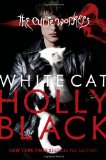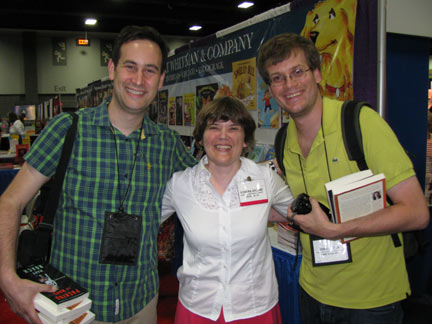Review of White Cat, by Holly Black
The Curse Workers, Book One
by Holly Black
Margaret K. McElderry Books (Simon & Schuster), New York, 2010. 310 pages.
Starred Review
“I wake up barefoot, standing on cold slate tiles. Looking dizzily down. I suck in a breath of icy air.
“Above me are starts. Below me, the bronze statue of Colonel Wallingford makes me realize I’m seeing the quad from the peak of Smythe Hall, my dorm.
“I have no memory of climbing the stairs up to the roof. I don’t even know how to get where I am, which is a problem since I’m going to have to get down, ideally in a way that doesn’t involve dying.”
If that isn’t a cliff-hanger beginning, it’s certainly a roof-balancing one. Cassel was dreaming of a white cat. So why is there a white cat outside, watching him on the roof? Later in the first chapter, Cassel tells us:
“Don’t be too sympathetic. Here’s the essential truth about me: I killed a girl when I was fourteen. Her name was Lila, she was my best friend, and I loved her. I killed her anyway. There’s a lot of the murder that seems like a blur, but my brothers found me standing over her body with blood on my hands and a weird smile tugging at my mouth. What I remember most is the feeling I had looking down at Lila — the giddy glee of having gotten away with something.”
I had already scanned the first chapter and decided not to turn it back in (because I have too many books checked out), when I met Holly Black at ALA and she talked about her book — and I moved it to the top of my stack of books to read. I was not disappointed. This book was one I had to keep reading once I started.
Cassel’s world is like ours, only certain people are born with the ability to perform curses. You can curse someone by touching their skin with your hands. But cursing is illegal, and everyone in that society wears gloves all the time.
Curses run a wide range. The most common are luck workers, but there are also people who can change memories, or people like Cassel’s mother who can give you whatever emotion she wants you to have. There are even people who can kill with a curse. Most rare of all are people who can transform things into something else.
All the curses have blowback to the person performing them — a strong reaction proportionate to the curse being performed. So if a memory worker changes a lot of memories, he will start forgetting things himself, for example.
However, Cassel is part of a family of curse workers — and also a family deeply involved in the world of organized crime. He’s the only one in his family who does not have the ability to curse anyone, and he’s been trying to lead a normal life at a private school, trying to forget about what he did to Lila, the reigning crime lord’s daughter. (His family covered it up.)
Now, though, with this sleep-walking caper at the beginning of the book, the school isn’t going to let him live in the dorm. He has to move back in with his brothers, which puts him in the thick of things again.
Holly Black has intricately and beautifully spun a world that seems plausible and real, even with those amazing premises. There are plots and counterplots and counter-counterplots, that get tied up cleverly at the end. Along the way, Cassel learns about making friends and trusting them.
I love that this is called “Book One,” because I can’t wait to read more about this fascinating world. This is a skilfully crafted novel that will make you look at gloves in a whole new way.
Find this review on Sonderbooks at: www.sonderbooks.com/Teens/white_cat.html
Disclosure: I am an Amazon Affiliate, and will earn a small percentage if you order a book on Amazon after clicking through from my site.
Source: This review is based on a library book from the Fairfax County Public Library.











